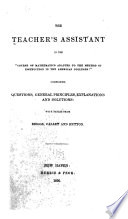 | Mathematics - 1836 - 488 pages
...Mechanics, Optics, Electricity and Magnetism. Body is any collection of matter existing in a separate form. Force is any cause which moves or tends to move a...body, or which changes or tends to change its motion. Hydrostatics is that branch of mechanics which treats of the equilibrium and motion of fluids in the... | |
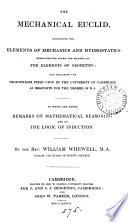 | William Whewell - 1837 - 226 pages
...NOTIONS. 1. MECHANICS is the science which treats of the laws of the motion and rest of bodies. 2. Any cause which moves or tends to move a body, or which changes or tends to change its motion, is called FORCE. 3. BODY or MATTEII is anything extended, and possessing the power of resisting the... | |
 | 1838 - 596 pages
...to understand this language here, we must take his definitions of force, and of equality of force. 'Any ' cause which moves or tends to move a body, or which changes ' or tends to change its motion, is called FORCE.' 'Two directly ' opposite forces which balance each other are equal. Forces are '... | |
 | Denison Olmsted - Physics - 1838 - 376 pages
...momenta as 8 to 5; what are their respective velocities ? Ans. As 24 to 35, or nearly as 5 to 7. 16. FORCE is any cause which moves or tends to move a body, o which changes or tends to change its motion. (Art. 2.) Forces can for the most part be reduced to... | |
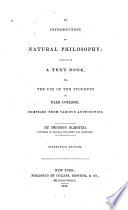 | Denison Olmsted - Physics - 1844 - 618 pages
...Pneumatics, Electricity, Magnetism, and Optics. Body is any collection of matter existing in a separate form. Force is any cause which moves or tends to move a...body, or which changes or tends to change its motion. Every force produces actual motion if it is not counteracted by contrary forces; but if it remains... | |
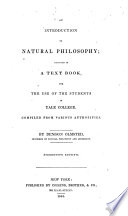 | Denison Olmsted - Physics - 1844 - 610 pages
...8 to 5 : What are their respective velocities ? Ans. As 24 to 35, or nearly as 5 to 7. 16. FORCE M any cause which moves or tends to move a body, or which changes or tends to change its motion. (Art. 2.) Forces can, for the most part, be reduced to th^ three following classes, attraction, repulsion,... | |
 | Denison Olmsted, Ebenezer Strong Snell - Physics - 1845 - 612 pages
...and therefore its mass is to be added to that of the log. 16. FORCE is any cause which moves or 1ends to move a body, or which changes or tends to change its motion. (Art. 2.) Forces can, for the most part, be reduced to the three following classes, attraction, repulsion,... | |
 | Denison Olmsted - Physics - 1846 - 454 pages
...its velo, city be as much greater as its weight is less. 23. FORCE is any cause which moves or tend to move a body, or which changes or tends to change its motion. (See Art. 3.) The measure of a force, is the change of motion which it produces ; and the momentum... | |
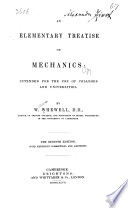 | William Whewell - Mechanics - 1847 - 208 pages
...INTRODUCTION. 1- MECHANICS is a science which treats of the motion and rest of bodies as produced by Force. Force is any cause which moves or tends to move a...body, or which changes or tends to change its motion. Every science involves certain ideas, by means of which we give unity and connection to our sensations,... | |
 | Denison Olmsted - Physics - 1851 - 492 pages
...much used in writings on physical subjects. In Natural Philosophy, we mean by particles, the smallest parts into which a body may be supposed to be divided...change its motion. Thus the elastic power of steam in propelhng a boat, the action of the wind upon, a sail, of a weight upon a clock, and of an animal in... | |
| |